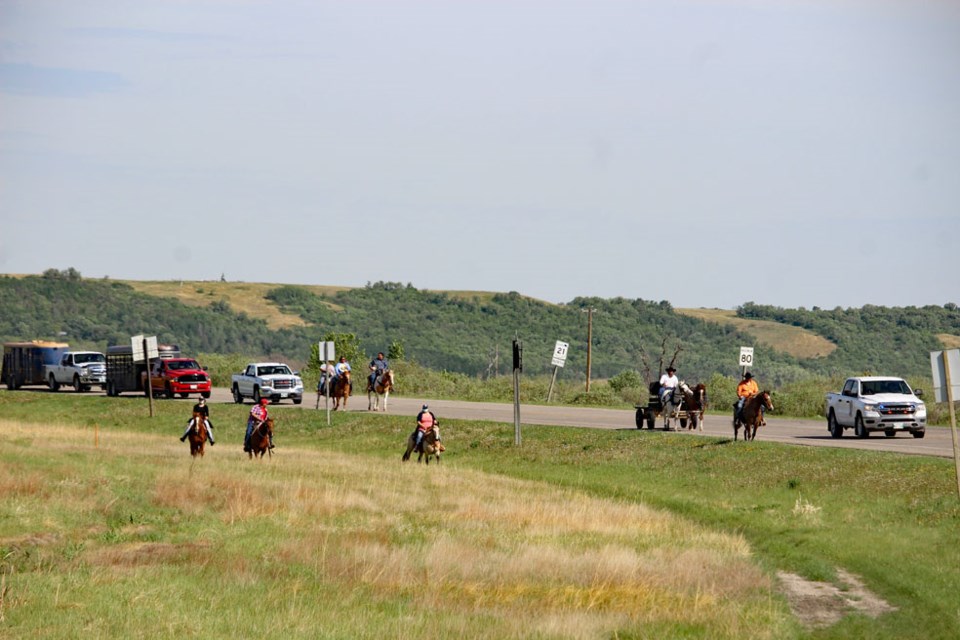To pay respect to the 215 children buried at Kamloops residential school in B.C., Sioux Valley Dakota Unity Riders travelled from the pow wow grounds in the valley to the PetroCan station on the TransCanada, Saturday, June 5.
News of the discovery at the Kamloops site brought fresh waves of pain to First Nations peoples.
Travis Mazawasicuna,a 55-year-old husband, father and Sioux Valley resident, described his feelings about the discovery and talked of healing in his relationship with his dad.
“I like to keep moving forward.” But he said this news “triggered a lot of stuff.” His own dad suffered all his life from residential school experiences. He turned to alcohol; it wrecked the family.
It was only shortly before his dad’s death, that father and son reconciled when his father began to share stories of his childhood trauma from residential school.
Mazawasicuna, one of the Unity Riders, said he was grateful to find out what took his dad out of his family life. “I felt robbed of my father, all my life.”
As the riders settled their horses, a man named Billy Taylor, announcer at the KODA radio station, spoke without notes to the group shouting to people well distanced on a windy day.
He said, “Many have gone through the residential school. Many have stories that they’re scared to talk about even to this day… the abuse that had happened at these schools. I myself, like many others, both my dad and my mom went to residential school.”
He said of the parents and the grandparents, “I can’t imagine having your child taken away from you. … Thankfully we will not see my children, my grandchildren have to go through that.”
Councillor with Sioux Valley Dakota Nation (SVDN) Evelyn Pratt brought her grandchildren to meet the riders. Pratt’s mother told her stories of her experiences. She said they knew, come fall, the big truck would come. Parents tried to prepare their children.
“They had no choice. But as parents, I think of myself, “says Pratt looking at her granddaughter, “How could I let her, at her age of six, to be loaded up on a truck sent away. It was a very sad time. They were crying.” The months that they would not see their parents would seem like an eternity.
Pratt hopes leaders of the churches involved will acknowledge the Kamloops discovery.
“This incident specifically, is tragic. Tragic! And people in the church, they knew about this; and government, they’ve known. They knew their records. And yet I look at our government and what is expected of us - accountability for every dime and every record. We’re monitored by all levels of government, but the same doesn’t apply to that system.”
Next, a team and wagon approaches. Driver, Anne Marie Tacan, says of the well-behaved horses, “We trained these boys ourselves.” She introduces grandson Kaysen Bonnaise Tacan on the back of the wagon.
Part of the ‘60s scoop she grew up at Woodnorth, just the other side of Virden. “My foster dad is named Bill Kotylak.” She smiles, “I had an awesome raising. The only thing lacking was, I didn’t know who I was all my life.”
She recalls asking him, “‘Dad, what (nationality) do you think I am?’ and he goes, ‘Humm I think you’re Indian and part French.’” she laughs, “Just guessing - all the files were held closed tight, so I didn’t know who I was until I was 18.”
Another Unity rider, former chief Vince Tacan says this discovery is timely for the youth.
“They didn’t know this happened to their grandparents and relatives and so, I think that they’re like most Canadians, they’re appalled. It’s difficult to cope with lost family connections, a loss to your community, your language, all the cultural stuff that goes along with that, the teachings.
“I think when people understand what happened to some of these people, then they can forgive and move on.”
Tacan explains further, “We had a ‘wiping of the tears’ ceremony for several young ladies who made a presentation to the federal government and to the province during one of our self-government negotiations. It was an eye-opener for everyone. For me as well. And after the ceremony, one young lady said ‘now I feel like I belong… now I have forgiveness because I understand that my parents couldn’t parent me, because they didn’t know how to parent. They weren’t parented themselves.’”
Tacan recalls his family’s experience. “My great-grandmother (Annie Wacanta) went to the residential school in Brandon to check on my mum, and others. And she camped at the boundaries of the school property. And people there, my mother was telling me, told her to leave. But she stuck to her guns and she pitched a tent and camped there overnight. She had supper with her grand-daughters there. She actually left them with a little bit of clothing.”
At this point, Tacan breaks, and for a moment he can’t speak… “and after she left, they burned the clothes … So those are the stories that are coming out.”
Unity rides are just one kind of spiritual practice on the part of the Dakota people. Next week, we look at Canupawakpa’s recognition of the 215 discovery.




